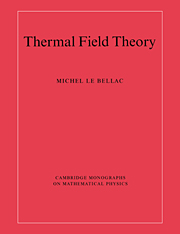Book contents
- Frontmatter
- Contents
- Preface
- 1 Introduction
- 2 Quantum statistical mechanics
- 3 The scalar field at finite temperature
- 4 Simple applications of perturbation theory
- 5 Dirac and gauge fields at finite temperature
- 6 Collective excitations in a plasma
- 7 Hard thermal loops and resummation
- 8 Dynamical screening
- 9 Neutrino emission from stars
- 10 Infrared problems at finite temperature
- A Formulary
- B Operator formalism
- References
- Index
Preface
Published online by Cambridge University Press: 05 May 2010
- Frontmatter
- Contents
- Preface
- 1 Introduction
- 2 Quantum statistical mechanics
- 3 The scalar field at finite temperature
- 4 Simple applications of perturbation theory
- 5 Dirac and gauge fields at finite temperature
- 6 Collective excitations in a plasma
- 7 Hard thermal loops and resummation
- 8 Dynamical screening
- 9 Neutrino emission from stars
- 10 Infrared problems at finite temperature
- A Formulary
- B Operator formalism
- References
- Index
Summary
Non-relativistic field theory at finite temperature and finite density was invented in the late 1950s for the theoretical description of condensed matter and nuclear matter under standard laboratory conditions. Although it does not involve concepts beyond the Schrödinger equation and statistical mechanics, it offers a most convenient theoretical framework with which to deal with a large number of particles. It is often referred to as the ‘Many-Body Problem’ or as the ‘N-Body Problem’. Relativistic field theory at finite temperature was first studied by Fradkin (1965) and rediscovered ten years later, the main motivation at the time being a description of the phase transition which occurs in the electroweak theory, at a temperature of the order of 200 MeV. This transition is of course of great interest for the history of the early Universe.
In the early 1980s, lattice gauge theories suggested the existence of a deconfined phase of quarks and gluons, which has been called the ‘quark–gluon plasma phase’, above a temperature which is estimated nowadays to lie around 150 MeV. The possibility of observing this new state of matter in ultrarelativistic heavy ion collisions gave a further boost to the study of finite temperature field theory. Furthermore, Braaten and Pisarski (1990a,b) made a theoretical breakthrough, which enabled them to reorganize perturbation theory, whose original formulation had led to nonsensical results in some circumstances.
- Type
- Chapter
- Information
- Thermal Field Theory , pp. xi - xivPublisher: Cambridge University PressPrint publication year: 1996

